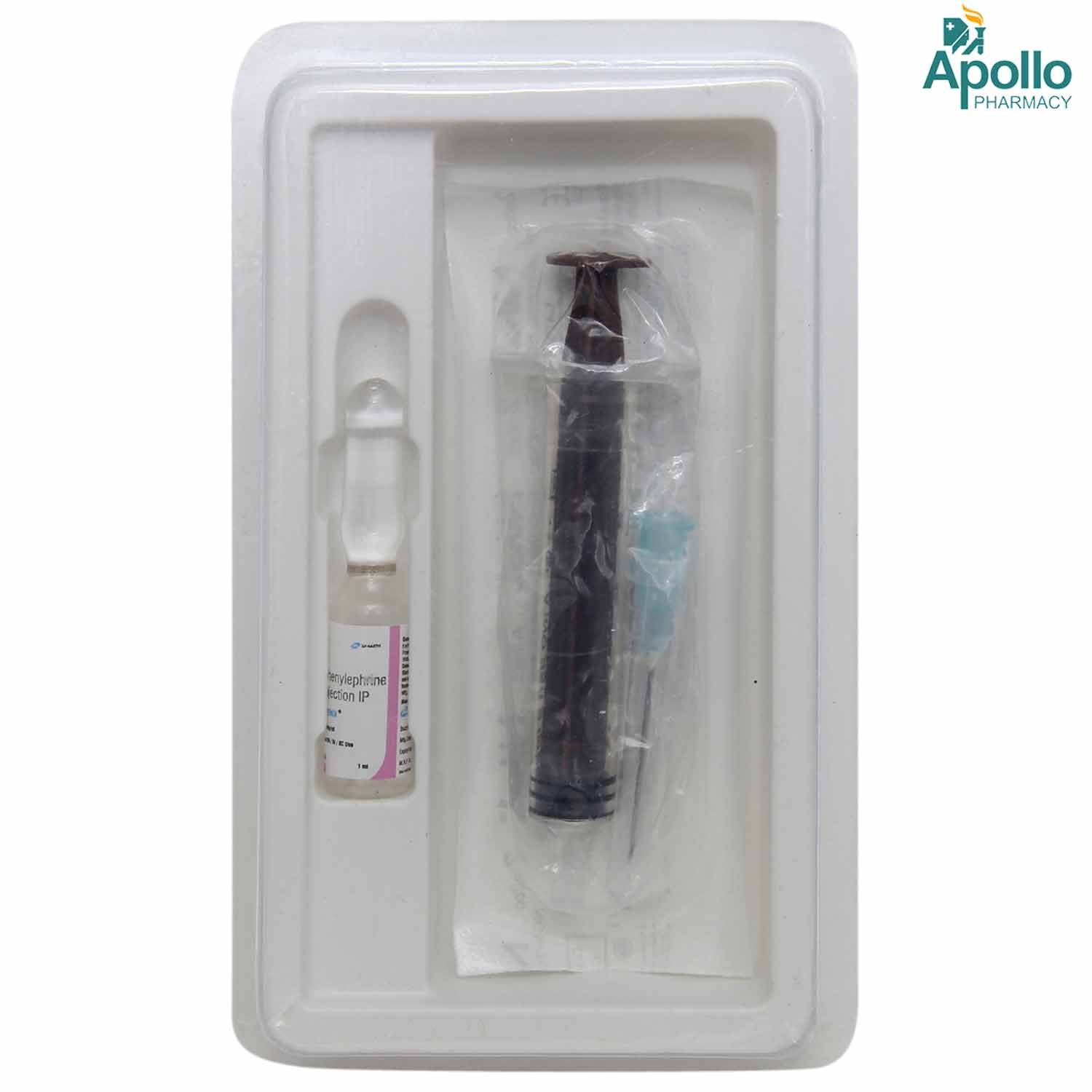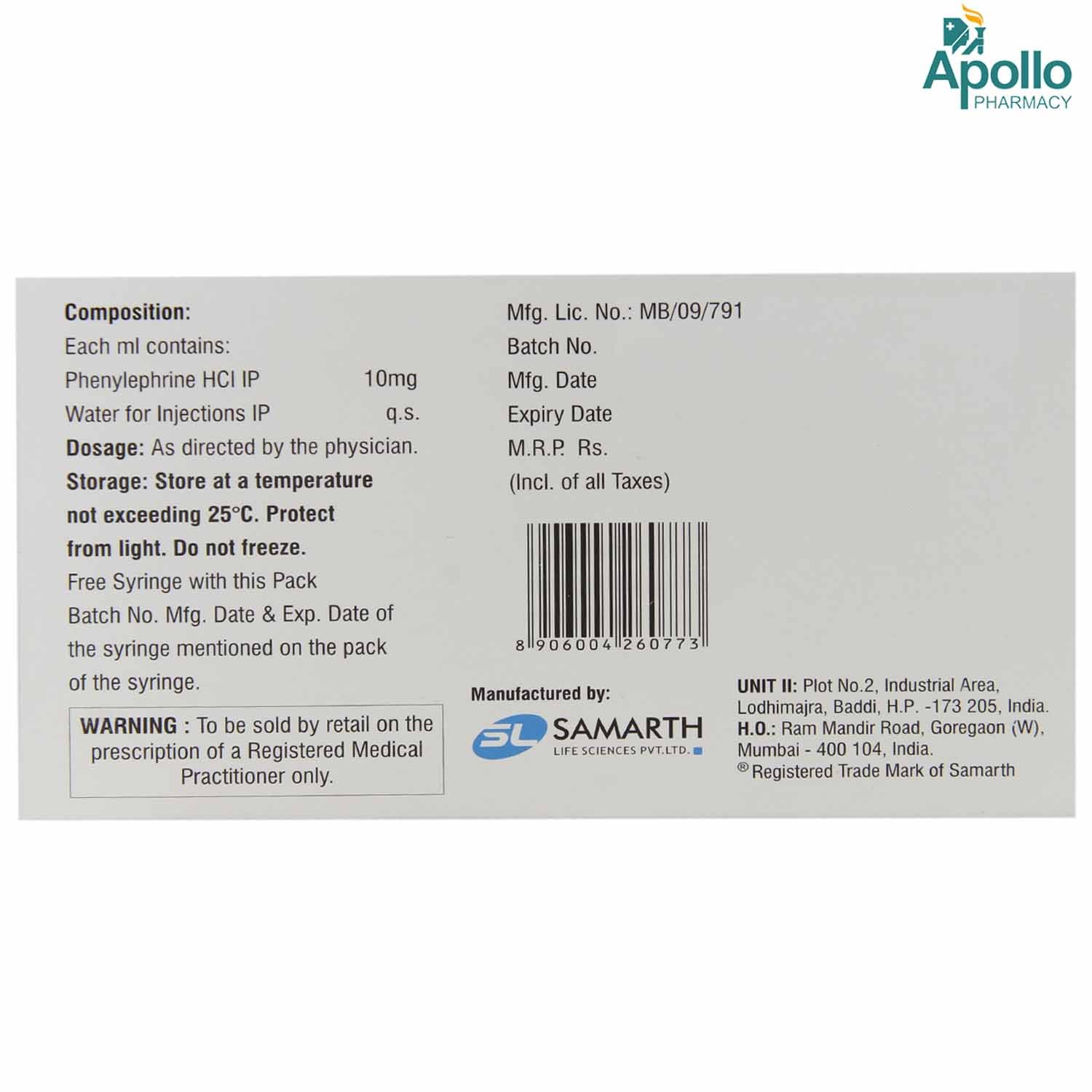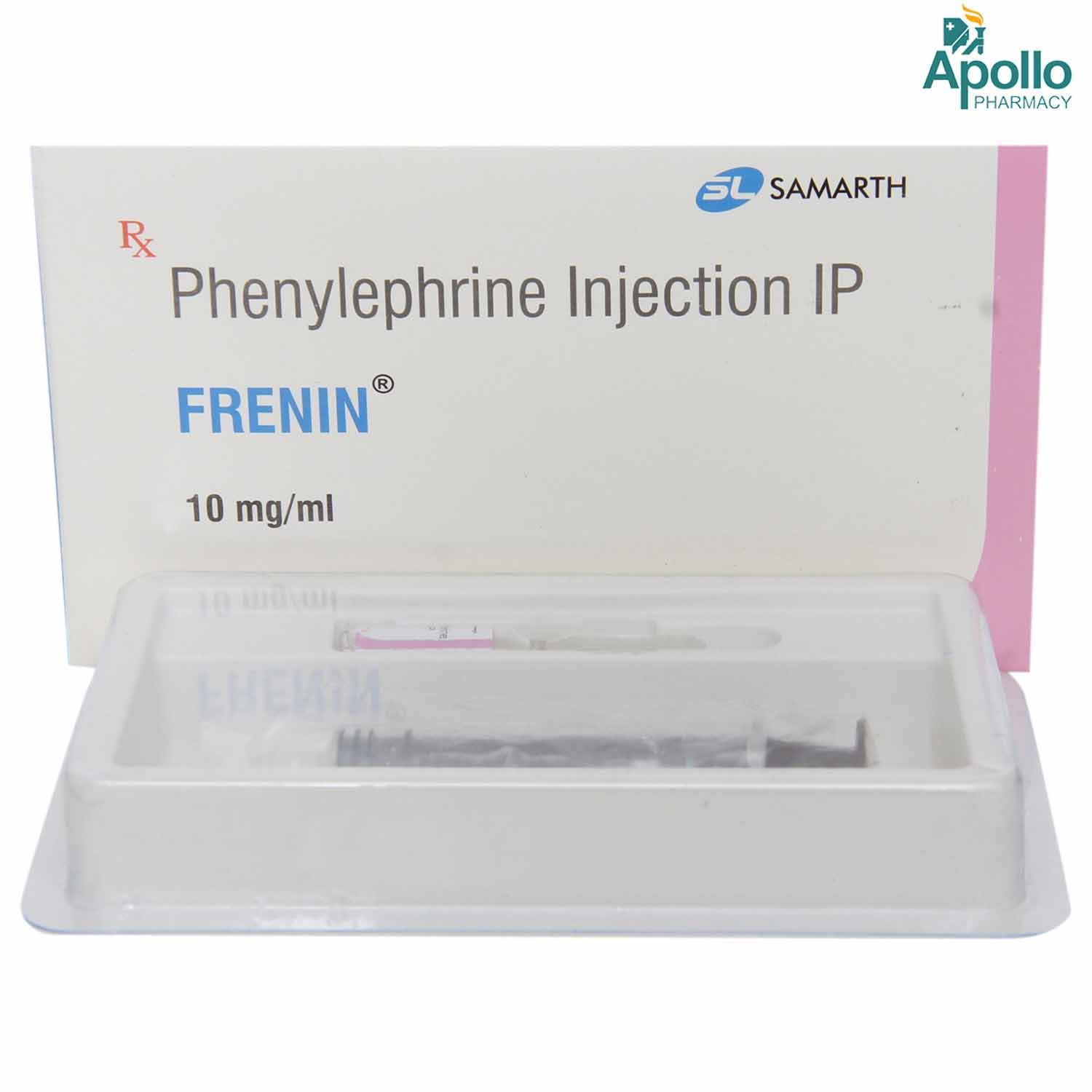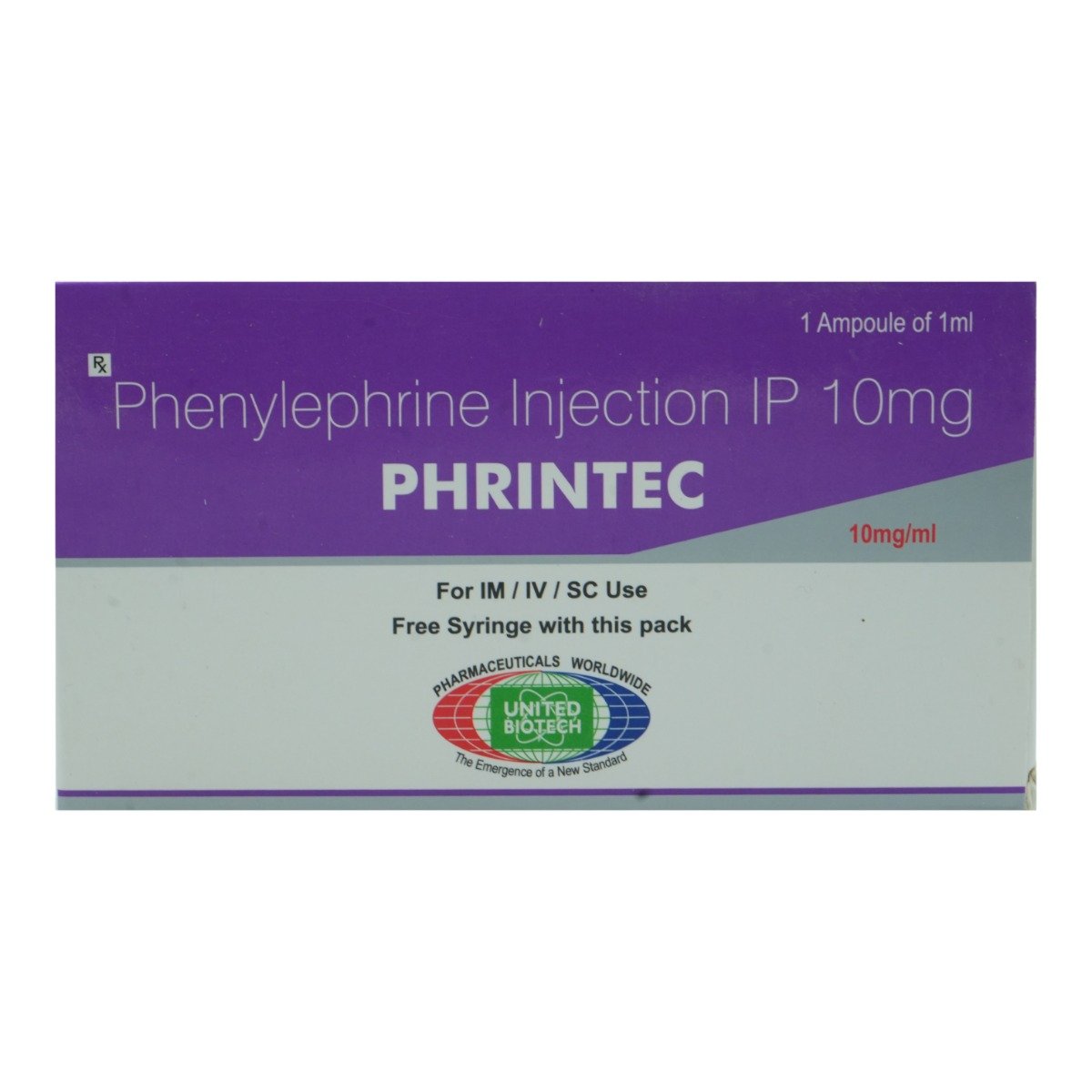Frenin Injection 1 ml
MRP ₹287
(Inclusive of all Taxes)
₹43.0 Cashback (15%)
Provide Delivery Location
Online payment accepted
 Prescription drug
Prescription drugWhats That
Composition :
Manufacturer/Marketer :
Consume Type :
Expires on or after :
Return Policy :
About Frenin Injection 1 ml
Frenin Injection 1 ml belongs to a class of medications called anti-hypotensives used to treat hypotension (low blood pressure) caused by spinal anaesthesia, circulatory failure or certain other medicines. Also, it is used to treat low blood pressure during surgery or after an injury. Hypotension is a condition in which the blood flows through the blood vessels at lower than normal pressures. Low blood pressure symptoms include tiredness, dizziness, light-headedness, loss of consciousness, nausea, depression, blurry vision, or clammy (wet or sweaty) skin.
Frenin Injection 1 ml contains Phenylephrine that works by constricting and narrowing blood vessels by acting on alpha receptors. Thus, it increases blood pressure and decreases heart rate.
Frenin Injection 1 ml will be administered by a healthcare professional; do not self-administer. In some cases, you may experience headache, vomiting, sweating, nervousness, tremor, shortness of breath, difficulty in passing urine or irregular heartbeat. Most of these side effects of Frenin Injection 1 ml do not require medical attention and gradually resolve over time. However, if the side effects persist, please consult your doctor.
If you are allergic to Phenylephrine or any other medicines, please tell your doctor. If you are pregnant or breastfeeding, please inform your doctor before receiving Frenin Injection 1 ml. Discuss with your doctor if you want to drive or operate machinery after receiving Frenin Injection 1 ml. Caution is advised when drinking alcohol while you are receiving Frenin Injection 1 ml.
Uses of Frenin Injection 1 ml
Directions for Use
Key Benefits
Frenin Injection 1 ml contains Phenylephrine, an anti-hypotensive agent used to treat low blood pressure caused by spinal anaesthesia, circulatory failure or certain other medicines. Also, it is used to treat low blood pressure during surgery or after an injury. It works by constricting and narrowing blood vessels by acting on alpha receptors. Thus, it increases blood pressure and decreases heart rate.
Storage
Drug Warnings
Please tell your doctor if you are allergic to Phenylephrine or other medicines. If you are pregnant or breastfeeding, please inform your doctor before receiving Frenin Injection 1 ml. Discuss with your doctor if you want to drive or operate machinery after receiving Frenin Injection 1 ml. Caution is advised when drinking alcohol while you are receiving Frenin Injection 1 ml. Frenin Injection 1 ml should not be given to you if you are taking or have taken monoamine oxidase (MAO) inhibitor medicines (used for depression) in the past 14 days.
Drug-Drug Interactions
Drug-Drug Interactions
Login/Sign Up
Taking Frenin Injection 1 ml with Propofol may lead to increased levels of Frenin Injection 1 ml leading to side effects like high blood pressure.
How to manage the interaction:
Taking Frenin Injection 1 ml with Propofol is not recommended, but it can be taken if prescribed by the doctor. Do not discontinue the medications without consulting a doctor.
Taking Furazolidone with Frenin Injection 1 ml can cause an increase in high blood pressure.
How to manage the interaction:
Taking Furazolidone with Frenin Injection 1 ml is not recommended, it can be taken if prescribed by the doctor. However, if you experience sudden and severe headache, blurred vision, confusion, seizures, chest pain, nausea or vomiting, sweating, lightheadedness, fainting, sudden numbness or weakness (especially on one side of the body), speech difficulties, fever, consult the doctor immediately. It is advised to use Frenin Injection 1 ml only after 14 days of stopping Furazolidone.
Co-administration of Frenin Injection 1 ml with Sevoflurane can increase the levels of Frenin Injection 1 ml and lead to side effects.
How to manage the interaction:
Taking Frenin Injection 1 ml with Sevoflurane is not recommended, it can be taken if prescribed by the doctor. Do not discontinue the medications without consulting a doctor.
Taking Tranylcypromine with Frenin Injection 1 ml can increase the risk of high blood pressure.
How to manage the interaction:
Taking Tranylcypromine with Frenin Injection 1 ml is not recommended, but can be taken together if prescribed by a doctor. However, consult a doctor if you experience severe headache, blurred vision, confusion, seizures, chest pain, nausea or vomiting, sudden numbness or weakness (especially on one side of the body), speech difficulties, fever, sweating, lightheadedness, and fainting Do not discontinue any medications without consulting a doctor.
Co-administration of Selegiline with Frenin Injection 1 ml together can raise blood pressure.
How to manage the interaction:
Taking Selegiline with Frenin Injection 1 ml is not recommended, it can be taken together if prescribed by a doctor. However, consult a doctor immediately if you experience any symptoms such as severe headache, blurred vision, confusion, fits, chest pain, nausea or vomiting, sudden numbness or weakness (especially on one side of the body), speech difficulties, fever, sweating, lightheadedness, and/or fainting Do not discontinue any medications without consulting a doctor.
Co-administration of Topiramate can cause increased body temperature and decreased sweating, and these effects may be worsened when combined with medications like Frenin Injection 1 ml.
How to manage the interaction:
Although there is a possible interaction between Frenin Injection 1 ml and Topiramate, you can take these medicines together if prescribed by your doctor. However, if you experience any unusual symptoms, consult the doctor. Do not discontinue any medications without consulting a doctor.
Co-administration of Frenin Injection 1 ml with Halothane may increase the risk of an irregular heart rhythm.
How to manage the interaction:
Although taking Frenin Injection 1 ml with Halothane together can result in an interaction, it can be taken if a doctor has prescribed it. However, if you experience any symptoms like lightheadedness, fainting, irregular heart beat, dizziness, consult the doctor. Do not discontinue any medications without a doctor's advice.
Co-administration of Nortriptyline with Frenin Injection 1 ml may lead to side effects like increased blood pressure.
How to manage the interaction:
Although taking Nortriptyline and Frenin Injection 1 ml together can result in an interaction, it can be taken if a doctor has prescribed it. Regular monitoring of blood pressure is advised. Do not discontinue any medications without a doctor's advice.
Co-administration of Amoxapine and Frenin Injection 1 ml together may lead to side effects like increased blood pressure.
How to manage the interaction:
Taking Frenin Injection 1 ml and Amoxapine together can result in an interaction, it can be taken if a doctor has advised it. However, if you experience any unusual symptoms, consult the doctor. It is advised to maintain blood pressure. Do not discontinue any medications without a doctor's advice.
Co-administration of Frenin Injection 1 ml with Phenelzine can result in extremely high blood pressure which may be serious.
How to manage the interaction:
There may be a possibility of interaction between Frenin Injection 1 ml and Phenelzine, but it can be taken if prescribed by a doctor. However, If you develop a sudden, severe headache, blurred vision, confusion, chest pain, nausea, vomiting, sudden numbness or weakness (particularly on one side of the body), difficulty speaking, fever, sweating, lightheadedness, or fainting, consult a doctor immediately. Do not stop using any medications without a doctor's advice.
Drug-Food Interactions
Drug-Food Interactions
Login/Sign Up
Diet & Lifestyle Advise
- Eat small meals more frequently.
- Drink plenty of fluids to stay hydrated as dehydration may reduce blood volume resulting in low blood pressure.
- Include vitamin B12-rich foods such as animal meats, eggs, fortified cereals, and nutritional yeast.
- Eat foods rich in folates such as beans, asparagus, lentils, leafy greens, citrus fruits, liver, and eggs.
- Try to eat smoked fish, canned soup, pickled items, cottage cheese, and olives, as salty foods can also increase blood pressure.
- Take frequent breaks if you exercise outdoors in extreme heat.
- Avoid spending a long time in hot tubs, steam rooms, and saunas to prevent dehydration.
Side Effects of Frenin Injection 1 ml
- Headache
- Vomiting
- Sweating
- Nervousness
- Tremor
- Shortness of breath
- Difficulty in passing urine
- Irregular heartbeat
Habit Forming
Therapeutic Class
All Substitutes & Brand Comparisons
RX
Phrintec 10 mg Injection 1 ml
United Biotech Pvt Ltd
₹285.5
(₹257.0/ 1ml)
RX
PHENPRES 10MG INJECTION 1ML
Neon Laboratories Ltd
₹371
(₹333.9/ 1ml)
29% COSTLIER
Author Details
We provide you with authentic, trustworthy and relevant information
Drug-Diseases Interactions
Drug-Diseases Interactions
Login/Sign Up
FAQs
Drug-Drug Interactions Checker List
- IMIPRAMINE
- LINEZOLID
- PHENELZINE
- IPRONIAZID
- NIALAMIDE
- OXYTOCIN
- GUANETHIDINE
- QUINIDINE
- ATOMOXETINE
- ATROPINE
- LITHIUM
- Pergolide
- BROMOCRIPTINE
Disease/Condition Glossary
Blood pressure is the measurement of the heart's force to pump blood to all parts of the body. Hypotension (low blood pressure) is a condition in which the blood flows through the blood vessels at lower than normal pressures. Low blood pressure symptoms include dizziness, tiredness, lightheadedness, loss of consciousness, nausea, depression, blurry vision, or clammy (wet or sweaty) skin. Systolic pressure is the pressure when the heart pumps blood out. On the other hand, diastolic pressure is the pressure when your heart is at the resting stage between heartbeats. If your blood pressure is 90/60 mm of Hg, it means the systolic pressure is 90 mm of Hg, and diastolic pressure is 60 mm of Hg. Normal blood pressure lies in between 90/60 mm of Hg and 120/80 mm of Hg. If the blood pressure is 90/60 mmHg or lower, it is considered low blood pressure.

Have a query?
Alcohol
Safe if prescribed
You are advised to be careful when drinking alcohol while you are receiving Frenin Injection 1 ml. However, if you have any concerns regarding this, please discuss them with your doctor.
Pregnancy
Consult your doctor
Limited data is available on the effect of Frenin Injection 1 ml in pregnancy. Hence, if you are pregnant or planning for pregnancy, inform your doctor before receiving Frenin Injection 1 ml.
Breast Feeding
Consult your doctor
Limited data is available on the effect of Frenin Injection 1 ml on breastfeeding. Hence, if you are a nursing mother, inform your doctor before receiving Frenin Injection 1 ml.
Driving
Safe if prescribed
Discuss with your doctor if you want to drive or operate machinery after receiving Frenin Injection 1 ml.
Liver
Consult your doctor
If you have a pre-existing history of liver disease, inform your doctor before receiving Frenin Injection 1 ml. Your doctor may adjust the dose of this medicine or prescribe a suitable alternative based on your condition.
Kidney
Consult your doctor
If you have a pre-existing or a history of kidney diseases, inform your doctor before receiving Frenin Injection 1 ml. Your doctor may adjust the dose of this medicine or prescribe a suitable alternative based on your condition.
Children
Safe if prescribed
If you have any concerns regarding the use of Frenin Injection 1 ml in children, please consult your doctor.













